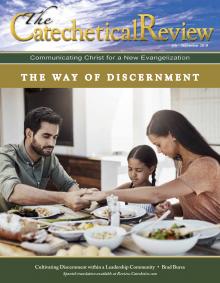What is the Neophyte Year?
Many of us may be aware of the RCIA process that is undertaken in many parishes, but have we stopped to ask ourselves the question, “What happens to the new Catholics after the Easter Vigil?” The Rite of Christian Initiation of Adults offers a period of Mystagogy for the seven weeks leading up to Pentecost, but then what?
The new Catholic, for the period up to the anniversary of their reception into the Catholic Church, is known as a “neophyte,” that is, “one who is initiated at the Easter Vigil. The term comes from the Greek word meaning newly planted.”[1] During this period, the parish should support the new Catholics in various ways to deepen their understanding of the faith. Ongoing catechesis is a necessary undertaking, if we are to continue to grow in faith and in love of Jesus Christ. This is echoed in the experience of the apostolic and early Church; for example, St. Paul counselled against neophytes becoming bishops too early (cf. 1 Tim 3:6) “lest their lack of experience in the faith render them arrogant or deficient.”[2] Similarly, the Council of Nicaea (325 A.D.) prohibited acceptance of a neophyte into holy orders, “lest being puffed up with pride, he fall into the judgement of the devil.”[3] It is clear from this prohibition that even in the fourth century, when the period of the catechumenate would have lasted several years,[4] the neophyte is still seen very much as in a period of early spiritual development. The questions might be asked: What kind of spiritual development is needed in new Catholics today? What should be happening during the Neophyte Year?
The Neophyte Year is a time which:
allows the neophytes to reflect on their experience of the sacraments, Scripture, grow closer to Christ through the Eucharist and participate more frequently in the parish. The parish community is called to mentor the neophytes as they begin to live as Christian disciples and fulfill their baptismal vocation to evangelize.[5]
Research into Current Neophtye Formation and Patristic Catechesis
In my M.A. and License studies at Maryvale Institute, Birmingham, I wrote and defended a dissertation on neophyte formation and patristic catechesis. This involved an empirical research element that studied responses of a questionnaire sent to 211 parishes in the Archdiocese of Westminster. It is not necessary to go into the results in any major detail here, but what was of interest was that a large majority of parishes did not appear to offer any ongoing formation during the neophyte year. Admittedly some parishes struggled in finding the extra resources and catechists to support ongoing neophyte formation. I also conducted research into sacramental participation in Sunday Eucharist, because the obligation of a Catholic “to attend Mass on Sundays and holy days of Obligation”[6] is the first precept of the Church. Participation in the Sunday Eucharist is a “testimony of belonging and of being faithful to Christ and to his Church”[7] and a way of witnessing to the truth of the Gospel.
My expectation was that a high percentage would be regularly attending weekly Sunday Eucharist as Christian living “requires being nourished through regular attendance at Mass.”[8] I also expected an enthusiasm for receiving Jesus weekly, because as the YouCat says: “Anyone who is really seeking Jesus’ friendship responds as often as possible to Jesus’ personal invitation to the feast.”[9] However, the reality was that less than 50% of those who had been through RCIA in a five year period were attending Sunday Eucharist weekly.[10] This is a worrying trend, because “some estimates indicate that as many as 50-70% of new Catholics (neophytes) cease to practice their faith within two years.”[11] This illustrates why ongoing neophyte formation should be a priority for parishes.
The rest of this online article is available for current Guild members.
This article is from The Catechetical Review (Online Edition ISSN 2379-6324) and may be copied for catechetical purposes only. It may not be reprinted in another published work without the permission of The Catechetical Review by contacting [email protected]
Articles from the Most Recent Issue
Free Mary’s Motherhood: A Healing Balm in Our Modern Times
Free The Eucharist and Our Call to Mission
The Passover and the Eucharist as Redemptive Sacrifices
- ‹ sebelumnya
- 2 dari 6
- selanjutnya ›



